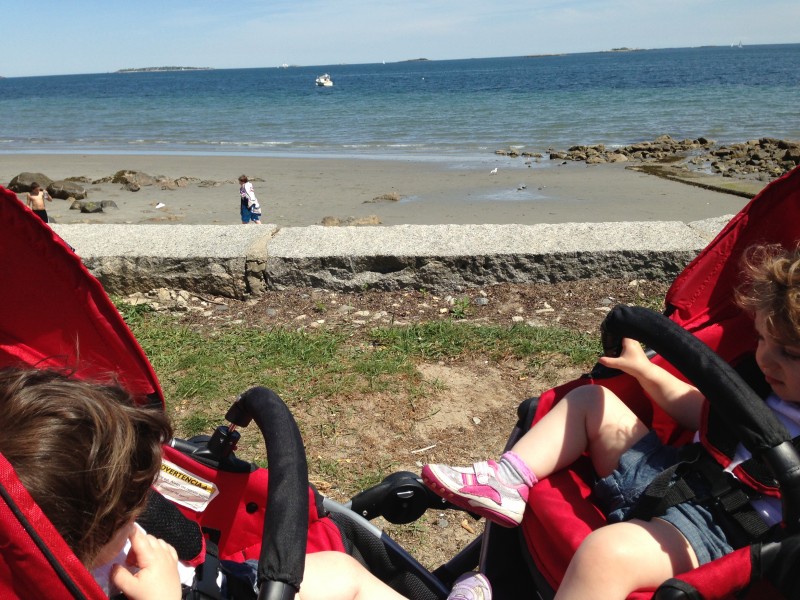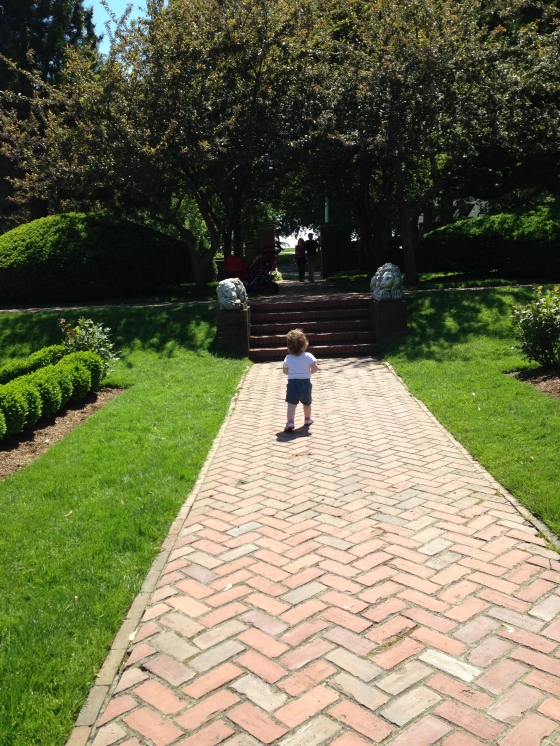I watched the mom and her son enter the waiting room. He was clutching the same big, round, brightly-colored plush animal that he’d brought with him the week before. She walked to sit in a chair along the wall across the room from me where she’d sat last week, and he started spinning and vocalizing happily near me and my girls, who were climbing on the chairs and rolling on the floor. The boy’s mother occasionally looked up from clipping the coupons she’d brought to check in on him. Her eyes flicked over to me once or twice, and I wondered if she was gauging my reaction to his atypical behavior. I smiled at her, trying to convey some sort of recognition, and wondered if she noticed Ham making some of the same kinds of happy noises from her spot on the floor, halfway under the row of blue plastic chairs.
I never really know how to start small talk with another person, but I’d missed my chance last week when I first “met” them and I knew that the following week would be our last before preschool, so I took aim and fired: “Coupons– smart! I usually just sit here playing around on my phone.”
Success– she smiled and we launched into some brief small talk. Beneath the surface I detected the delicate dance in which we both knew, but had to pretend we didn’t, that the other’s child was autistic. I don’t think of “autistic” as an insult, and yet, I know better than to be presumptuous and risk offending. We peppered our conversation with clues– I allowed the acronym “ABA” to slide in without providing context, indicating that I knew she knew what that was– until we hit a point where, I think, we knew we’d both said it in so many words.
As an aside, I wish we could just skip all of that and go straight to the part where we just say it already, but it seems like most other parents aren’t quite ready for that and I’m trying to make friends here.
We talked about preschool. I moved across the room to talk to her. She said her son wasn’t in a sub-separate classroom like mine are about to be because she wants him to be around “normal” kids. Not even an integrated class– she skirted the public school system, which likely would have offered some services to her son, and sent him to a private preschool with an ABA aide. Only “normal” kids.
“He imitates their behavior,” she said, “so of course, we want him imitating normal behavior.”
Ah. There it is.
It’s hard to make autism mom friends.
I don’t expect everyone to do things exactly the way I’d do them. Quite the opposite, really– I need my friends to help me navigate, not just tell me I’m holding the map correctly as we head for an iceberg. I don’t want yes-men, I want other ideas. Other possibilities. Gentle prodding, telling me to consider another angle sometimes. This is all uncomfortable but good.
But.
There’s a foundation to be laid, and everything surrounding autism is rife with controversy. Some things I can’t abide, and seemingly minor parenting decisions all point back to methodologies and philosophies of raising autistic kids that turn really quickly into friendship barriers.
I’m okay with a friend feeding her kid M&Ms for dinner on Thursday because the kid has been screaming all day and her spouse has been on a business trip and she’s just exhausted. I’m okay with it because I’ve been there. The hypothetical friend and I share the philosophy that sometimes you just gotta lean in and roll with it because toddlers are terrifying and mighty creatures, and as long as your life consists of a baseline of 95% good choices and 5% survival choices, you’re probably doing okay. But I would not be able to maintain a friendship long-term with someone who fed their kids M&Ms for dinner every night for weeks on end, with no concern for nutrition. There is a fundamental difference.
I can’t sustain a long-term “we understand each other, and being friends with you fills the hole that my non-autism-parent friends just can’t” relationship with someone whose primary concern for her child is that he learn to adapt and imitate “normal” kids (normal really is one of my least favorite words), or someone who doesn’t consider how it might feel to deprive her child of the chance to have an autistic friend who “gets” him. It makes me wonder if she sees him spinning and vocalizing with joy in the waiting room– bothering absolutely no one– and processes the event through the filter of how she thinks other people are seeing him. He’s a sweet little boy! I love the happy sounds he makes. I love the happy sounds my girls make, too– even the impish little noises that tell me specifically in what way Chicken is misbehaving (she actually has different happy noises for bothering the dog, taking the roll of contact paper out of the art cabinet she’s not meant to be in, and climbing on the table). It’s part of who my girls are.
I won’t fault a parent for having a hard time with autism itself, and I know it’s controversial to even suggest separating out autism from the autistic person, but listen– at the very least, the happy parts of autism are part of your child. Maybe the hard parts with seizures and sensory overload and screaming and anxiety, those you are allowed to separate out and get angry at. But damn, enjoy the happy noises, even if they happen in an otherwise quiet waiting room. It’s cute as hell and it’s communication. Normal is stupid and boring.
There are other reasons to be wary of potential autism mom friends. I run waaaay the hell in the other direction when vaccines get introduced into the conversation. No one ever brings that up at all unless it’s to question if they played a role. I won’t even entertain that one anymore. That’s red flag #1. Other little things, I can handle. I do ABA, you do FloorTime or SonRise? That’s okay! We don’t have to live out our days in identical fashion to relate to one another. But the premise has to match, and in the volatile autism world, it’s hard to line that piece up with someone else and get a match.
I do have a few autism mom friends, and luckily, some are even local. At the very least, finding your tribe is a bit easier when the internet lets you cast a wide net. But man… those incidental moments when a potential friend seems to serendipitously appear before you? I wish more of those could work out. It means so much to be able to lock eyes across the waiting room and tell someone without words that you understand.



You must be logged in to post a comment.